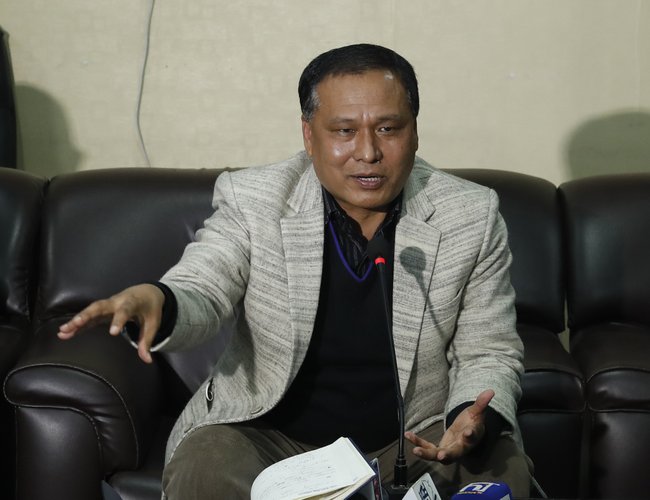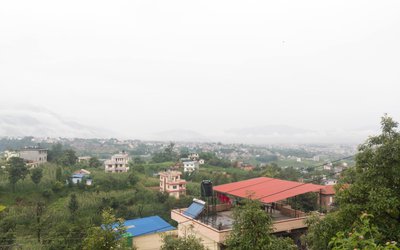
Managing director of Nepal Electricity Authority (NEA) Kulman Ghisng said that the the Electricity Distribution Bylaws, 2078 BS is going to be a game changer in the supply, distributions and improvements of quality of supply of electroicty to the consumers.
The bylaws endorsed by the 892nd meeting of the NEA Board of Directors on January 4, 2022 have now come into effect.
One of the important provision in the by law is allowing the customers to charge a vehicle with a separate meter of larger capacity in their home compound if the vehicle cannot be charged without the approved load for domestic use.
With the new by law, NEA has decided to provide electricity along with transformers to encourage large investment in electric charging stations.
The power utility has made arrangements to provide meters to the customers if they demand a separate meter for charging electric vehicles at home through the Electricity Distribution Bylaws, 2078 BS.
MD Ghising said that the new customer-friendly electricity distribution bylaws have been implemented to provide electricity service quickly, easily and at cheaper rate and to increase electricity consumption.
"In the past, there was an attempt to ban everything as there was load-shedding. Now, with the end of load-shedding, it is imperative to increase the consumption of electricity generated in the country. With this in mind, we have implemented new bylaws to provide reliable and quality service to the customers as per the demand and to increase the power consumption as well,” said Ghising.
"We are reducing electricity tariffs to increase consumption. We are also trying our best to make the service customer-friendly by facilitating it."
Through the bylaws, the NEA has implemented policies for construction and operation of charging infrastructure for electric vehicles.
It is mentioned that permission will be given to the approved body / firm / person / company to set up public charging stations in private houses, offices, firms / companies / institutions, private and public places and private real estate.
Institutions operating public charging stations in major urban areas will be given priority, said the NEA.
In addition, the government, public institutions and the local levels will be given priority if they want to operate a public charging station.
The provision has also been made to set up a public electric vehicle charging station on public land with the approval of the government.
"The NEA will provide electricity service, including transformers, to the service providers setting up charging stations with electricity demand up to 200 KV. In the case of charging stations with higher demand, the work of HT line will be done by the Authority but the rest of the work including transformer connection will be done by the service providers," he said.
A separate electricity tariff has also been introduced for charging stations.
The NEA has also provided facilities for milk moistening centres and cold storages run by cooperatives and drinking water and irrigation operated by cooperatives or communities.
The NEA will supply power from its own transformers to such customers whose demand is up to 200 KV.
This will reduce the cost of purchasing transformers for such customers and they will benefit from this facility, said Ghising.
“Previously, customers had to purchase transformers at their own expense if they had to take loads of up to 50 KV and above from the NEA's transformers. We have now tried to provide relief to the customers by removing it and providing power supply to the industries carrying load up to 100 KV from the transformers of the Authority," he added. "If the load is more than 100 KVA, the customers have to buy the transformer themselves."
Earlier, only 50 per cent of the capacity of the available transformer was supplied with electricity, but now such a ceiling has been removed. The NEA has made an arrangement to cut the line of the house of the customers who charge higher tariff than specified by NEA to the tenants.
The NEA has made arrangements to cut the line of such households if it is found that they have collected more charge than the stipulated tariff from the tenants.
Arrangement has also been made for the tenants to get electricity service by keeping a separate meter after fulfilling certain conditions. With such an arrangement, even the consumers living in rented houses will be able to consume affordable electricity services like other customers.
Arrangements have also been made in the bylaws to provide electricity service to the consumers living in apartments, mostly residential buildings, colonies if the prescribed conditions are met.
At present, the apartments have been taking electricity from NEA and supplying it to the occupants at a high cost.
Ghising said that the electricity consumption would increase due to the increase in the use of electronic equipment as the occupants of the apartment could now get electricity directly from the NEA by taking a meter. Pay the arrears in installments
The customers who have arrears of electricity tariff will be able to pay in installments.
Customers who have been blacklisted for non-payment of electricity tariff will be able to pay it in up to 12 installments to reconnect the electricity.
- 139 People Died In The Disaster
- Jul 27, 2024
- Monetary Policy Eases Managing Capital Fund Stress
- Jul 27, 2024
- Weather Forecast: Chances Of Heavy Rainfall Is Likely In One Or Two Places Of Sudu Paschim And Bagmati Province
- Jul 27, 2024
- The Sentiment Of Monetary Policy Seems Focused On Increasing Eemand: FNCCI President Chandra Prasad Dhakal
- Jul 26, 2024
- Monetary Policy 081/82 Is Making The Economy More Dynamic: Governor Adhikari
- Jul 26, 2024
















